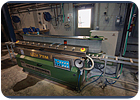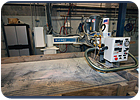
Tile Market of Delaware, Inc., an importer and distributor of ceramic tile and natural stone as well as a custom stone fabricator, has continually grown and expanded its operation since its establishment in 1996. Its fabrication facility, which measures approximately 20,000 square feet, houses a variety of state-of-the-art machinery.
Tile Market of Delaware, Inc., an importer and distributor of ceramic tile and natural stone as well as a custom stone fabricator, has continually grown and expanded its operation since it was established in 1996. Today, the company’s production stands at 20 to 25 kitchens per week, but owner John Watson plans to add a second shift to the shop in hopes of more than doubling the company’s current output. “Tile Market of Delaware’s growth has averaged greater than 15% annually since inception, and we continue to explore new opportunities to tap into other markets,” the owner said.
The company is currently operating out of three separate locations in Delaware. The corporate headquarters is located in Wilmington, and includes a 56,000-square-foot facility that houses a design center, administrative offices and a distribution warehouse.
The stone fabrication division, Stone Shop, is also located in Wilmington and consists of two buildings totaling approximately 20,000 square feet. The space consists of a machining and fabrication shop, layout area, office space and an indoor slab storage area for weather-sensitive slabs, while additional slabs are kept outside. Furthermore, the company’s satellite office is located in Lewes, about 90 miles south of the headquarters. All tile and fabrication products are marketed through the two high-end design centers as well as through select dealers in Delaware, and the surrounding states of New Jersey, Pennsylvania and Maryland.
Watson began his career in the tile business, where he spent nine years working as a regional sales manager for American Marazzi Tile, an Italian-owned manufacturer. After that, he, along with his wife, Kim, and brother, Tim, decided to open a ceramic tile distributorship. “The initial core of our business was selling ceramic tile and natural stone tile to the wholesale trade,” Watson said. “As a tile distributor, we had many requests for custom stone countertops and eventually began selling them and subcontracting the work out to local fabricators. However, as the demand for fabrication work grew, it became increasingly more difficult to meet our customer’s demands.” In an effort to meet those demands, Tile Market of Delaware launched a 4,600-square-foot shop, and has since expanded the shop three times. “Our latest expansion helped complete our transition from a manual fabrication company to a true CNC shop,” the fabricator added.

The company's Stone Shop, located in Wilmington, DE, houses a CMS/Brembana Dual Table Maxima CNC, which the company runs for about nine to 10 hours a day.
Equipping the shop
The Stone Shop is equipped with a variety of state-of-the-art equipment, which has contributed to the huge success of the company, according to Watson. The facility houses a CMS/Brembana Dual Table Maxima CNC, which the company runs for about nine to 10 hours a day. “The capabilities are nearly limitless from wide arcs to furniture style bump outs and unique high-end profiles,” said Watson, adding that the machine only takes 20 minutes to cut, shape and polish an undermount sink cut out. A CMS/Brembana Antea CNC saw is also in place at the shop, and utilizes the same software as the Maxima.The company’s fabrication facility also includes a Sierra bridge saw, which is used to cut hand fabrication jobs and small pick-up orders, as well as a Wizard Radial Arm Polisher - both of which are manufactured by Park Industries of St. Cloud, MN. For polishing backsplashes, workers in the shop rely on a Marmo Meccanica LCV 711 inline edge polisher from Marmo Machinery USA of Southfield, MI, which was purchased in 2005.
Tile Market of Delaware is also an environmentally friendly shop as it operates a Denver Tidy Water Recycling System from VIC International Corp. of Knoxville, TN, a suspended air filtration system from Air Flow Systems and a Ghines Dust Collector for dry cutting and grinding. “Now that our shop is almost entirely wet, we do not use this unit as much,” said Watson. “However, in the case where you have to do dry cutting or grinding, it effectively traps and removes stone dust.”
According to Watson, a Gorbel overhead crane system, along with several vacuum lifters from Wood’s Powr-Grip, increases workshop efficiency and speed. “A single person can load and unload bridge saws and CNCs, plus it is a “back-saver,” he said, adding that this helps reduce workers compensations claims.
Tile Market of Delaware’s most recent purchase was an ETemplate Digital Measuring System, which helped complete the company’s transition to an automated CNC shop, according to Watson. “The digital template system requires one person to template, and cuts the template time in half,” he said. “But, more importantly, it saves us a tremendous amount of time in the digitizing of templates. The ETemplate system does 80% of the work that we used to do in our template check department, and it does it by simply taking 15 to 20 photos.”
All of these investments were made to increase the company’s production capabilities in order to produce the best quality product for its customers, according to Watson. “The Dual Table Maxima is a model of efficiency,” he said. “While one side is being fabricated, the other side is being unloaded and loaded. During a single 8-hour shift, the Maxima has a total down time of about 10 minutes. But, in order to achieve that you have to have an extremely efficient operation down the line.”
Workers in the shop also utilize a Marmoelettromeccanica Master 3500 router from Regent Stone Products of Virginia Beach, VA, as well as Diamut CNC tooling, Barranca air polishers and Alpha polishing pads, which are purchased through Salem Stone of Winston-Salem, NC, and Braxton-Bragg of Knoxville, TN.
The company’s installation fleet includes five Chevy 3500’s, and each van is equipped with two F. Barkow Stone Carriers.

For polishing backsplashes, workers in the shop use a Marmo Meccanica LCV 711 inline edge polisher from Marmo Machinery USA of Southfield, MI, which was purchased in 2005.
Switching to
an automated shop
Switching from a manual shop to a fully automated shop didn’t happen overnight, according to Watson.“The process for CNC operation and efficiency is a never-ending quest,” said the fabricator, adding that since technology changes so fast it is imperative to stay in touch with the latest developments. “This dynamic characteristic is what makes our industry so challenging and fun. I was fortunate to have employees with prior CNC experience and we went out and hired other experienced CNC supervisors and operators. This helped cut the initial learning process down. Within one month of the first CNC being delivered, we were probably 50% efficient. After three months, 75% efficient, and then beyond that, the task of becoming more efficient slows down considerably. I don’t believe that you can ever achieve 100% efficiency; however, our goal is to come as close as possible. To get there, it requires on going evaluation of equipment, tooling, programming, procedures and time benefit analysis.
“The biggest hurdle to overcome when we made the switch from a manual shop to an automated shop was all of the procedural changes,” Watson went on to say. “We had to completely change every single step in all of our processes - from template, to paperwork flow, to scheduling, etc. Everything that is done in support of producing products with CNC technology had to be rethought. Learning the actual programming and operating of the equipment went fairly smooth. Of course, the key to the entire transformation was having exceptionally dedicated people on staff that were determined to make it work.”

A Park Industries Wizard Radial Arm Polisher gives the company the ability to hone any surface, according to owner John Watson.
Current production
The main focus of the company’s fabrication division is wholesale high-end residential countertops, but it also fabricates and installs custom tub decks, fireplace surrounds, shower enclosures and steps, among others. Tile Market of Delaware works with a variety of natural stones, including granite, marble, travertine, limestone, onyx, quartzite and engineered stone, and primary markets include Delaware, Maryland, Pennsylvania and New Jersey.Today, the company runs one shift, producing an average of 20 to 25 kitchens a week, and plans are underway to add a second shift to the operation in hopes to more than double current output.
The company directly imports ceramic tile and natural stone from Italy, Spain, Turkey and Mexico, and they also source products from domestic factories and other importers. Some slabs are directly imported to the company, but the majority comes from major East Coast importers, so that they can offer a much wider inventory selection to its customers.
The company currently employs a staff of 85 - 35 of which are in the fabrication division. “We strongly believe in the benefits of cross training our employees,” said Watson, adding that all key positions have back-ups just in case. Furthermore, all new employees go through an extensive background check, and all new shop and installation employees are given a medical evaluation, baseline hearing test and respirator fit test, according to the fabricator. “We currently have a hearing conservation program in an effort to provide a safe working environment for our employees,” he added.
“Our staff strives to exceed customer expectations, and this is done by educating and helping them in a friendly and professional manner,” he said. “Our employees realize that the level of service a customer receives almost always determines where that customer finally decides to do business. Without our quality employees, we would simply be just another tile store that offers fabrication.”
As a fabricator, Watson finds it challenging to decide how to position the company and its products. “In the past a fabricated granite countertop was usually produced with quality first and foremost in the mind of the fabricator,” he explained. “Today, that is not always the case and the overall quality of produced goods has dropped dramatically. Many fabricators are so price driven that quality takes a back seat. Competition is always good and healthy for any market, but when a business owner decides that price is going to drive their business, the quality of the end product is usually compromised.
“It is incumbent upon us to educate our customers about the benefits of a quality job,” he continued. “We must explain to them the steps that have been taken to ensure that their whole experience, which begins with selecting the right slab, having it fabricated to precise specifications and then installed to their expectations. It is easy to throw out a low price and deliver an inferior product; however, it takes a quality company to deliver what the customer wants and expects, at a fair price.”